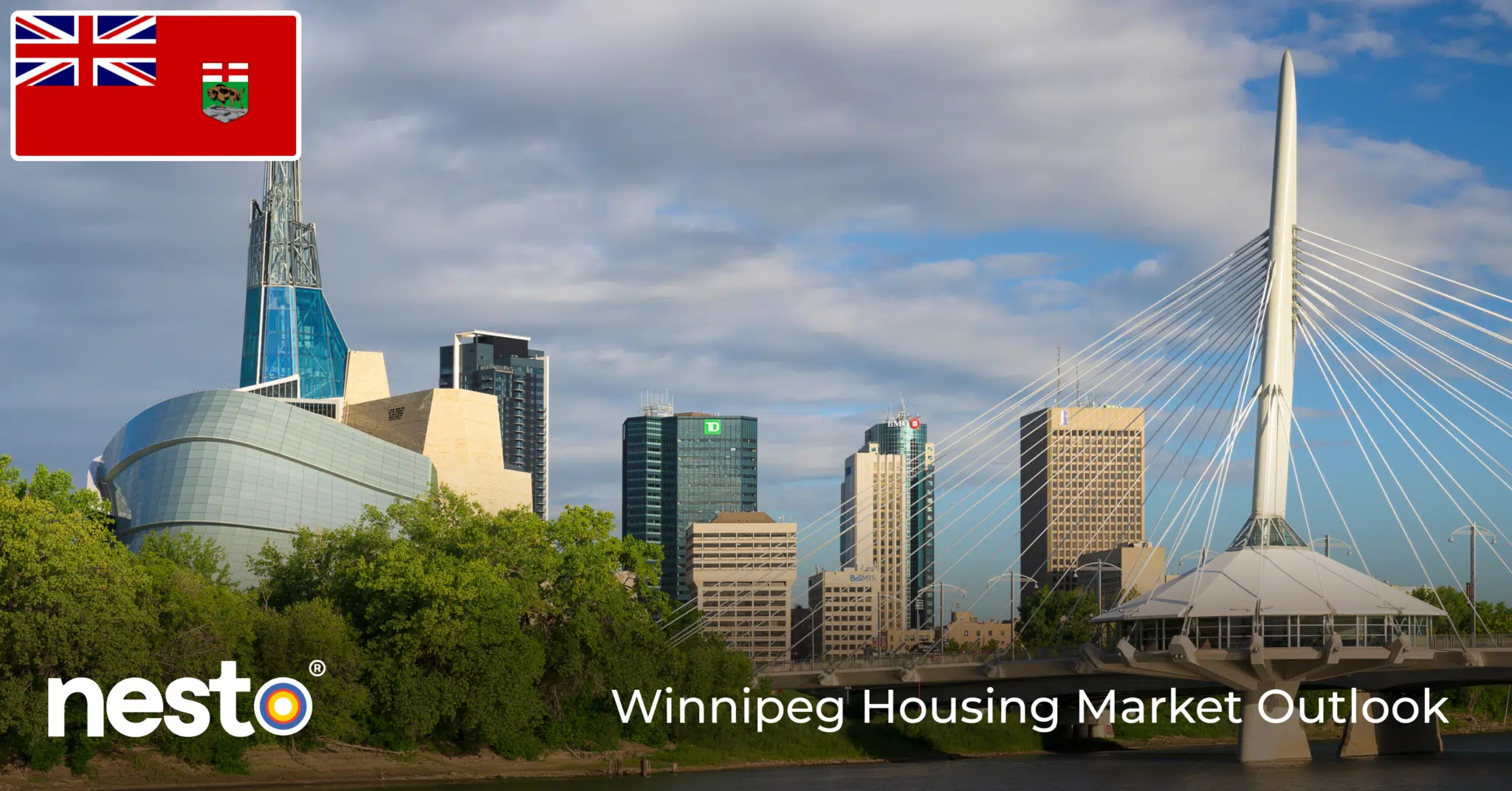Canadian Housing Market Outlook 2026

Home Sales Fall As New Listings Surge And Inventory Nears Balanced Levels
Canada’s housing market began 2026 with softer sales and rising supply, as winter disruptions and cautious buyers slowed activity in key regions. National home sales declined 5.8% month over month in January, while new listings jumped 7.3%. The result was a noticeable shift in short-term market balance rather than a structural drop in demand.
Actual sales activity came in 16.2% below last year, and the MLS Home Price Index declined modestly both monthly and annually. The national average sale price was also slightly lower year over year. However, inventory remains below long-term norms, and months of inventory remain close to historical balanced levels, indicating that the market is cooling rather than correcting.
Canadian Supply Expands As Sales Slow
The national sales-to-new-listings ratio (SNLR) declined to 45%, down from the end of 2025 and slightly below its long-term average. This suggests conditions are moving toward balance after tighter supply conditions in prior years.
Approximately 140,000 properties were listed for sale across Canada at the end of January, up from last year but still below the historical average for this time of year. Months of inventory rose to just under 5 months, which sits near the long-term national benchmark for balanced market conditions.
In practical terms, buyers across Canada are seeing more choice. Sellers remain active, particularly in markets such as Montreal, Calgary, and parts of British Columbia, while weather-related slowdowns have affected parts of Ontario.
Canadian Home Prices Show Regional Divergence
National home prices declined modestly compared to last year, but trends vary sharply by province. Ontario continues to face downward pressure due to elevated inventory and softer sales, particularly in higher-priced urban centres. British Columbia remains subdued, while the Prairies and Quebec are seeing comparatively stronger conditions.
This regional divergence indicates that Canada does not have a single housing story.
Canadian Housing Outlook 2026 to 2028
National home sales are projected to recover gradually through 2026 and beyond, though volumes are expected to remain below long-term averages. Ontario and British Columbia are likely to see temporary rebounds driven by pent-up demand, while the Prairies and Quebec remain comparatively resilient.
New housing construction is expected to decline nationally through 2028, particularly in condominium segments where presales remain weak. Purpose-built rental construction will continue to support supply, but that momentum will moderate as rental vacancy rates rise.
Canada’s rental market is moving toward balance. Higher vacancy rates and slower rent growth are increasing renters’ flexibility, potentially delaying homeownership decisions.
Overall, Canada’s housing market in early 2026 reflects a normalization amid economic pressures rather than a collapse. Sales have cooled, supply has expanded modestly, and prices are stabilizing regionally. The trajectory for the remainder of the year will depend on employment stability, the direction of mortgage rates, and the pace at which sidelined buyers regain confidence.
Canadian Housing Market Highlights
- The average selling price of a home in Canada decreased by 4.9% year-over-year to $658,300 in January.
- The average selling price of a single-family home in Canada decreased by 4.6% year-over-year to $731,900 in January.
- The average selling price of a townhouse/multiplex in Canada decreased by 6.2% year-over-year to $596,100 in January.
- The average selling price of a condo in Canada decreased by 5.9% year-over-year to $467,100 in January.
- The average rent in Canada decreased by 2% year-over-year to $2,057 for January.
- February 21, 2026: Today’s lowest mortgage rate in Canada is
for a 5-year fixed.
Data from the Canadian Real Estate Association (CREA) indicates that the benchmark price of resale residential homes sold across Canada in January was $658,300, and it decreased by 4.9% compared to a year ago.
CREA also reported a sales-to-new-listings ratio (SNLR) of 45%, indicating Balanced market conditions nationally for January.
Composite Home Prices
![]()
The average selling price of a home in Canada was $658,300 for the month of January, that’s decreased by 0.3% month over month. On a year-over-year basis, Canadian home prices have decreased 4.9% year-over-year.
Single-family Home Prices
![]()
The average selling price of a single-family home in Canada was $731,900 for the month of January, that’s decreased by 0.2% month over month. On a year-over-year basis, single-family home prices in Canada have decreased by 4.6% year-over-year.
Townhouse and Multiplex Prices
![]()
The average selling price of a townhouse in Canada was $596,100 for the month of January, that’s decreased by 1% month over month. On a year-over-year basis, the price of a townhouse in Canada has decreased by 6.2% year-over-year.
Condo Prices
![]()
The average selling price of a condo in Canada was $467,100 for the month of January, that’s decreased by 0.5% month over month. On a year-over-year basis, the price of a condo in Canada has decreased 5.9% year-over-year.
Transactions – Number of Sales
![]()
The number of sales in Canada was 36,186 during January, that’s decreased by 5.8% month over month. On a year-over-year basis, sales in Canada have decreased by 12.5% year-over-year.
New Listings
![]()
The number of new listings in Canada was 80,487 during January, that’s increased by 7.3% month over month. On a year-over-year basis, new listings in Canada have decreased by 5.4% year-over-year.
Real Estate Market
![]()
The sales-to-new-listings ratio (SNLR) in Canada was 45% during January, indicating a Balanced. On a monthly basis, that’s decreased by 12.2% month over month. Canada’s yearly sales to new listings ratio has decreased by 7.4% year-over-year.
The sales-to-new-listings ratio (SNLR) measures the number of home sales compared to new listings. An SNLR below 40% indicates a buyer’s market, where buyers hold the upper hand and greater negotiating power. An SNLR between 40% and 60% is a balanced market, while an SNLR of over 60% is considered a seller’s market.
Annual Changes in Composite Home Prices by Province
Annual Changes to the National Composite Home Prices
We’re curious…
Are you a first-time buyer?
Rents Stabilizing After 16 Months of Declines
Canada’s rental market is no longer in freefall, but it has returned to a state of adjustment. The latest national data shows average asking rents declined year over year for the 16th consecutive month. However, the pace of decline has slowed for 3 straight months. This pattern signals a transition from correction to stabilization across most major markets.
Are Rents Still Falling Across Canada?
Rents remain lower than last year in the largest provinces, including BC, Alberta, Ontario, and Quebec. The steepest declines are concentrated in Vancouver and Toronto, two markets that saw outsized growth during the post-pandemic surge. At the same time, provinces such as Saskatchewan and parts of Atlantic Canada continue to see rent growth. This regional divergence confirms the national slowdown is uneven and driven largely by previously overheated urban centres rather than a broad collapse in demand.
Why Are National Rents Cooling?
Several forces are working together to cool down rents. First, new supply has expanded meaningfully over the past 2 years, particularly purpose-built rental and condo completions in major urban centres. Second, population growth has moderated relative to the peak years of immigration. Third, unit sizes have shrunk, lowering total asking rents even as rents per square foot continue rising.
In fact, rents per square foot increased year over year, even while headline rents declined. That means renters are paying slightly more for space, but occupying smaller units. Affordability improvements are therefore partly compositional rather than purely price-driven.
Which Rental Segments Are Strongest Nationally?
Purpose-built rentals have the most stable tenures across Canada. Condo rentals have experienced the sharpest annual declines, especially for studio and 1-bedroom units. These investor-heavy segments are adjusting more quickly as supply outpaces softer demand.
Three-bedroom units are the national outlier. In multiple provinces, larger units have posted modest rent growth. Family-sized rentals remain in shorter supply relative to demand, supporting pricing resilience.
Shared accommodation rents have also declined nationally, reflecting softer demand from students and temporary residents compared to peak levels.
Is Rental Affordability Improving in Canada?
Rental affordability has improved meaningfully. The national rent-to-income ratio has fallen below the commonly cited 30% affordability threshold for the first time in years. That improvement reduces financial pressure on households and may slow the urgency to transition into homeownership, especially in high-priced urban centres.
What Does Rental Affordability Signal for Canada’s Housing Market?
The rental correction is occurring alongside elevated resale inventory and softer home sales in several provinces. Stabilizing rents suggest the market is absorbing recent supply without systemic stress. However, weaker condo rents could pressure investor-owned units and influence future pre-construction activity.
Canada Market Rents Snapshot
The average rent in Canada was $2,057 for the month of January, which decreased by 2% year over year.
The average rent for a 1-bedroom apartment in Canada was $1,792 for the month of January, which decreased by 3.4% year over year.
The average rent for a 2-bedroom apartment in Canada was $2,176 for the month of January, which decreased by 0.8% year over year.
Rental Price Changes by City
| Rank | CITY | Total Average | 1 Bedroom | 2 Bedrooms | Year-over-Year Change |
|---|---|---|---|---|---|
| 1 | North Vancouver | $2,958 | $2,469 | $3,287 | −2.2% |
| 2 | Vancouver | $2,650 | $2,362 | $3,279 | −4.8% |
| 3 | Oakville | $2,502 | $2,216 | $2,576 | −19.3% |
| 4 | Toronto | $2,504 | $2,183 | $2,801 | −8.6% |
| 5 | North York | $2,528 | $2,127 | $2,688 | −1.9% |
| 6 | Burnaby | $2,505 | $2,144 | $2,809 | −6.7% |
| 7 | Coquitlam | $2,524 | $2,107 | $2,765 | −3.9% |
| 8 | Mississauga | $2,446 | $2,043 | $2,454 | −8.6% |
| 9 | Etobicoke | $2,382 | $2,102 | $2,562 | −8.3% |
| 10 | Kanata | $2,412 | $2,238 | $2,502 | −17.3% |
| 11 | Brampton | $2,361 | $1,910 | $2,208 | −7.2% |
| 12 | Kingston | $2,315 | $1,968 | $2,502 | 22.0% |
| 13 | Scarborough | $2,318 | $1,910 | $2,417 | −5.6% |
| 14 | Vaughan | $2,266 | $2,082 | $2,499 | −6.7% |
| 15 | Greater Sudbury | $2,067 | $1,918 | $2,167 | −2.4% |
| 16 | Langley | $2,344 | $2,071 | $2,465 | −1.8% |
| 17 | Burlington | $2,376 | $2,065 | $2,443 | −5.0% |
| 18 | Ajax | $2,248 | $1,814 | $2,229 | −4.5% |
| 19 | Halifax | $2,270 | $2,052 | $2,500 | 0.10% |
| 20 | Victoria | $2,224 | $1,942 | $2,605 | −5.1% |
| 21 | Guelph | $2,159 | $1,979 | $2,291 | −4.0% |
| 22 | Kelowna | $2,015 | $1,686 | $2,124 | −10.8% |
| 23 | Surrey | $2,124 | $1,818 | $2,249 | −8.5% |
| 24 | Ottawa | $2,127 | $1,945 | $2,458 | −2.8% |
| 25 | New Westminster | $2,120 | $1,872 | $2,611 | −7.4% |
| 26 | Waterloo | $2,230 | $2,028 | $2,367 | −2.7% |
| 27 | Oshawa | $2,121 | $1,753 | $2,052 | −5.4% |
| 28 | Nanaimo | $2,055 | $1,820 | $2,328 | 8.20% |
| 29 | Barrie | $2,154 | $1,904 | $2,184 | −1.2% |
| 30 | East York | $2,302 | $1,963 | $2,554 | −4.3% |
| 31 | Hamilton | $2,069 | $1,753 | $2,086 | 0.40% |
| 32 | Brossard | $2,066 | $1,794 | $2,169 | 1.60% |
| 33 | Cambridge | $2,057 | $1,797 | $2,101 | −6.4% |
| 34 | Kamloops | $1,992 | $1,805 | $2,161 | 5.60% |
| 35 | Airdrie | $1,954 | $1,450 | $1,739 | −0.9% |
| 36 | Laval | $2,098 | $1,710 | $2,348 | 11.00% |
| 37 | Kitchener | $2,013 | $1,819 | $2,130 | −4.5% |
| 38 | Brantford | $1,979 | $1,802 | $2,058 | 0.50% |
| 39 | Niagara Falls | $1,929 | $1,684 | $1,899 | −9.4% |
| 40 | Montreal | $1,913 | $1,710 | $2,216 | −1.3% |
| 41 | London | $1,916 | $1,650 | $2,051 | −4.5% |
| 42 | Gatineau | $1,885 | $1,655 | $2,072 | −4.7% |
| 43 | Calgary | $1,871 | $1,535 | $1,850 | −3.9% |
| 44 | Peterborough | $1,973 | $1,677 | $1,991 | −2.3% |
| 45 | St. Catharines | $1,827 | $1,608 | $1,945 | −1.2% |
| 46 | Welland | $1,675 | $1,506 | $1,823 | −0.4% |
| 47 | Windsor | $1,658 | $1,523 | $1,839 | −0.1% |
| 48 | Sarnia | $1,728 | $1,508 | $1,833 | −3.9% |
| 49 | Winnipeg | $1,664 | $1,409 | $1,796 | 3.10% |
| 50 | Côte Saint-Luc | $1,535 | $1,402 | $1,787 | −21.4% |
| 51 | Edmonton | $1,591 | $1,279 | $1,619 | −2.6% |
| 52 | Saskatoon | $1,566 | $1,350 | $1,554 | 4.50% |
| 53 | Lethbridge | $1,528 | $1,369 | $1,570 | 0.70% |
| 54 | Quebec City | $1,485 | $1,364 | $1,646 | −12.3% |
| 55 | Red Deer | $1,529 | $1,219 | $1,489 | 5.90% |
| 56 | Regina | $1,466 | $1,255 | $1,538 | 4.80% |
| 57 | Fort McMurray | $1,370 | $1,167 | $1,419 | −1.3% |
| 58 | Medicine Hat | $1,372 | $1,217 | $1,395 | 0.10% |
| 59 | Lloydminster | $1,235 | $1,025 | $1,340 | 7.70% |
| 60 | St. John's | $1,238 | $1,086 | $1,250 | −6.4% |
Source: Rentals.ca Network Data & Urbanation Inc.
Rental Price Changes by Province
Rental Price Growth by Housing Type
How Does Renting Compare with Homeownership Across Canada?
Each $100,000 in mortgage balance costs an average of $509.35 per month on nesto’s lowest fixed 5-year rate at
For each $100,000 in mortgage balance, a 0.25% change in Canada’s policy rate impacts the monthly payment by $13.23. Rates used for calculation are those offered on insured purchases with less than a 20% downpayment on a 25-year amortization. Canada’s policy rate is 2.25%, and nesto’s prime rate is 4.45%.
We’re curious…
Are you a first-time buyer?
Frequently Asked Questions (FAQ) About the Canadian Housing Market in 2026
Why are national home prices forecast to rise in Canada even after recent corrections?
Canadian home price forecasts reflect pent-up demand combined with structurally low housing supply rather than renewed speculation. Ongoing population growth and limited new construction continue to support national home prices despite recent regional corrections.
Is Canada entering a nationwide housing recovery in 2026?
Canada is not experiencing a uniform housing recovery in 2026, as market conditions vary widely across regions. Some regional markets are stabilizing or rebounding, while others continue to adjust due to affordability constraints and elevated inventory levels.
What is the most significant factor limiting Canadian housing demand in 2026?
In 2026, income qualification limits under mortgage stress test rules are the primary constraint on Canadian housing demand, as mortgage rates have stabilized while home prices remain elevated.
Are Canadian housing market conditions favouring buyers or sellers in 2026?
Canadian housing market conditions in 2026 remain close to balanced nationally, although buyer-friendly conditions are emerging in regions with higher inventory, particularly in Ontario and BC.
Will Canadian home sales increase through 2026 without further interest rate cuts?
Canadian home sales are expected to increase gradually in 2026 as buyer confidence improves and pent-up demand returns, even without additional interest rate cuts.
Why Choose nesto
At nesto, our commission-free mortgage experts, certified in multiple provinces, provide exceptional advice and service that exceeds industry standards. Our mortgage experts are salaried employees who provide impartial guidance on mortgage options tailored to your needs and are evaluated based on client satisfaction and the quality of their advice. nesto aims to transform the mortgage industry by providing honest advice and competitive rates through a 100% digital, transparent, and seamless process.
nesto is on a mission to offer a positive, empowering and transparent property financing experience – simplified from start to finish.
Contact our licensed and knowledgeable mortgage experts to find your best mortgage rate in Canada.
Ready to get started?
In just a few clicks, you can see our current rates. Then apply for your mortgage online in minutes!



